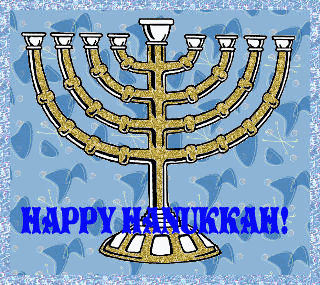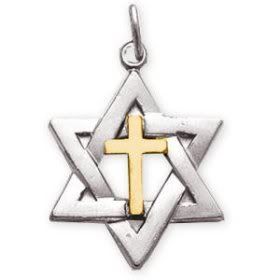The Messiah in Hanukkah (from heartofwisdom.com)

The law did not require Jews to be at the Temple in Jerusalem, as this was not one of the pilgrimage festivals. Every one observed it in his own place, not as a holy time. Jesus was there that He might improve those eight days of holiday for good purposes.
Jesus walked in the temple in Solomon’s porch when the Sadduciens asked him “How long dost thou make us to doubt? If thou be the Christ tell us.” They pretended to want to know the truth, as if they were ready to embrace it; but it was not their intention. Jesus answered them, I told you, and ye believed not: the works that I do in my Father’s name, they bear witness of me. But ye believe not, because ye are not of my sheep, as I said unto you. My sheep hear my voice, and I know them, and they follow me (John 10:25-27). He had told them, and they believed not; why then should they be told again, merely to gratify their curiosity?
Miracles
Hanukkah’s theme is of a miracle. During Hanukkah Jesus spoke of His miracles: If I do not the works of my Father, believe me not. But if I do, though ye believe not me, believe the works: that ye may know, and believe, that the Father is in me, and I in him (John 10:37-38). Jesus wanted the people of his day to see His miracles and believe in Him as a result. His miracles point to his divine and messianic identity. In this way Yeshua personifies the message of Hanukkah: God actively involved in the affairs of his people. Hanukkah reminds us that God is a God of miracles, not just of concept and religious ideals. He has broken through into human history and continues to do so today. All of us who know Yeshua can speak of God’s working in our lives (Gilman 1995).
Jesus is the Light of the World
Jesus preached three sermons in which he declared Himself the “light of the world,” and all three could have been during Hanukkah, the Festival of Lights. (It is not clear from the text when this incident happened, but it was some time between the Feast of Tabernacles and the Feast of Dedication (Hanukkah); both of these celebrations focused on light).
Then Jesus said unto them, Yet a little while is the light with you. Walk while ye have the light, lest darkness come upon you: for he that walketh in darkness knoweth not whither he goeth. While ye have light, believe in the light, that ye may be the children of light. These things spake Jesus, and departed, and did hide himself from them (John 12:35-36).
Just before Jesus announced that He was the Light of the world, Jesus had shone upon the conscience of those who accused the adulteress. Read the story in John Chapter 8. John also records Jesus healing a blind man (9:1-12) at about the same time (8:12 and 9:5) that Jesus declared himself to be the Light of the world. When he had thus spoken, he spat on the ground, and made clay of the spittle, and he anointed the eyes of the blind man with the clay, And said unto him, Go, wash in the pool of Siloam, He went his way therefore, and washed, and came seeing (John 9:5-7).
End Times
The story of Hanukkah can be compared with end-time happenings described in the books of Revelation and Daniel. Antiochus is a type of the antichrist. Just as happened under the rule of Antiochus, Daniel prophesied in Daniel 9:27 And he shall confirm the covenant with many for one week: and in the midst of the week he shall cause the sacrifice and the oblation to cease, and for the overspreading of abominations he shall make it desolate, even until the consummation, and that determined shall be poured upon the desolate.
The same powers promoted by Antiochus are in the world today. Worldwide immorality, and idolatry are the norm. We must come out and be separate. And what agreement hath the temple of God with idols? for ye are the temple of the living God; as God hath said, I will dwell in them, and walk in them; and I will be their God, and they shall be my people. Wherefore come out from among them, and be ye separate, saith the Lord, and touch not the unclean thing; and I will receive you. The deceiver stands waiting to devour in this present culture (2 Cor. 6:16-17).
Was Jesus Conceived on Hanukkah?
Many believe that our Messiah, the “light of the world,” was conceived on the festival of lights—Hanukkah. The Bible does not specifically say the date of Jesus’ birth. It was not during the winter months because the sheep were in the pasture (Luke 2:8). A study of the time of the conception of John the Baptist reveals he was conceived about Sivan 30, the eleventh week (Luke 1:8-13, 24). Adding forty weeks, for a normal pregnancy reveals that John the Baptist was born on or about Passover (Nisan 14). Six months after John’s conception, Mary conceived Jesus (Luke 1:26-33); therefore Jesus would have been conceived six months after Sivan 30 in the month of Kislev—Hanukkah. Was the “light of the world,” conceived on the festival of lights? Starting at Hanukah, which begins on Kislev 25 and continues for eight days, and counting through the nine months of Mary’s pregnancy, one arrives at the approximate time of the birth of Jesus at the Festival of Tabernacles.
